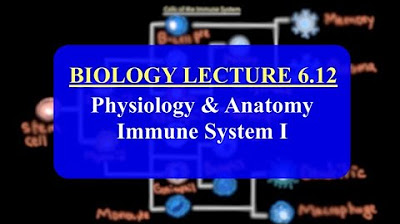IMAT Biology Lesson 6.13 | Anatomy and Physiology | Immune System Part II
Summary
TLDRThis video from Med School EU delves into the intricacies of the immune system, focusing on the innate and adaptive responses to infection. It explains the roles of macrophages and neutrophils as first responders, the inflammatory response, and the activation of the adaptive immune system by dendritic cells. The video also highlights the lymphatic system's role and the production of specialized antibodies by plasma cells, concluding with a comparison of innate and adaptive immunity, emphasizing their differences in speed, specificity, and memory.
Takeaways
- 🛡️ The immune system is complex and consists of two main parts: the innate and the adaptive immune system.
- 👨⚕️ The innate immune system is the first line of defense and includes cells like macrophages and neutrophils that perform phagocytosis.
- 🚨 Histamine is released by damaged cells and acts as an alarm to recruit immune cells to the site of infection, promoting inflammation.
- 🔬 Macrophages are considered the 'captains' of the innate immune system, controlling the immune response and directing other cells.
- 💥 Neutrophils are aggressive 'warriors' that engulf bacteria and undergo apoptosis to prevent further damage, forming pus as they die.
- 📈 The body produces and destroys about a hundred billion neutrophils daily, highlighting the scale of the immune response.
- 🔄 Inflammation is a universal response to damage or perceived threats, characterized by pain, redness, swelling, heat, and loss of function.
- 🚫 Inflammatory responses are limited in certain delicate areas like the brain and spinal cord to prevent damage to nerve cells.
- 🔗 Dendritic cells bridge the innate and adaptive immune systems by capturing antigens and presenting them to T cells in the lymphatic system.
- 🔬 The lymphatic system is a network of vessels and nodes that transport large proteins and fats, and is integral to the adaptive immune response.
- 🛠️ Helper T cells activated by dendritic cells enhance the activity of phagocytes and promote a more specific immune response against pathogens.
Q & A
What is the main focus of the video script provided?
-The video script focuses on explaining the immune system, particularly the innate and adaptive immune responses, using a hypothetical example of how the body responds to an infection.
What are the first responders of the innate immune system?
-The first responders of the innate immune system are phagocytes, specifically macrophages and neutrophils, which are responsible for identifying and engulfing pathogens.
How do neutrophils identify harmful bacteria?
-Neutrophils identify harmful bacteria through glycoproteins on the bacterial cells that correspond to what the neutrophils are looking for, unlike the glycoproteins on healthy cells.
What role does histamine play in the immune response?
-Histamine is an inflammatory chemical released by healthy cells that have been killed due to an injury or infection. It promotes inflammation in the affected area, signaling an alarm for immune cells to respond.
What is the function of macrophages in controlling the immune response?
-Macrophages act as the captains of the innate immune system, telling other cells what to do, activating neutrophils, and regulating the immune response to prevent further damage by ordering neutrophils to undergo apoptosis when necessary.
How do neutrophils contribute to the inflammatory response?
-Neutrophils, when activated, engulf several bacteria and, once exhausted, undergo apoptosis, forming pus. This process contributes to the inflammatory response by increasing the presence of white blood cells at the site of infection.
What is the role of the dendritic cell in the immune system?
-The dendritic cell captures snapshots of the battlefield by taking parts of the bacteria or their glycoproteins and delivers them to the adaptive immune cells, specifically T cells, activating them and bridging the innate and adaptive immune responses.
What is the purpose of the lymphatic system in the immune response?
-The lymphatic system serves as a network of vessels and nodes that transport lymph, a fluid containing immune cells and proteins, throughout the body. It helps in the circulation of immune cells and the removal of interstitial fluid.
How do helper T cells contribute to the adaptive immune response?
-Helper T cells, once activated by dendritic cells, arrive at the site of injury and use cytokines to activate phagocytes, enhancing their ability to fight off pathogens and promoting a more effective immune response.
What is the significance of memory T cells and memory B cells in the adaptive immune response?
-Memory T cells and memory B cells are crucial for long-term immunity. They remember previous infections and can respond more quickly and effectively to the same pathogen if encountered again, preventing or reducing the severity of future infections.
How does the specificity of the immune response differ between innate and adaptive immunity?
-Innate immunity is unspecific, providing a broad response to various pathogens, while adaptive immunity is highly specific, with immune cells and antibodies tailored to target specific antigens of the pathogens encountered.
Outlines

This section is available to paid users only. Please upgrade to access this part.
Upgrade NowMindmap

This section is available to paid users only. Please upgrade to access this part.
Upgrade NowKeywords

This section is available to paid users only. Please upgrade to access this part.
Upgrade NowHighlights

This section is available to paid users only. Please upgrade to access this part.
Upgrade NowTranscripts

This section is available to paid users only. Please upgrade to access this part.
Upgrade NowBrowse More Related Video

IMAT Biology Lesson 6.12 | Anatomy and Physiology | Immune System Part I

(209) Inflammation, B cells and Antibodies

Types of immune responses: Innate and adaptive, humoral vs. cell-mediated | NCLEX-RN | Khan Academy

Sistema Imunológico e Imunidade Inata | Anatomia etc

IMMUNOLOGY- Innate Immunity and Adaptive Immunity (FL-Immuno/01)

Humoral Immunity | The B-Lymphocytes | Immunology | Physiology
5.0 / 5 (0 votes)